Books
Books
published in 2021

Mix & Stir
Kitty Zijlmans, Helen Westgeest
Mix & Stir, this book’s aim is an endeavour to understand art as being a panhuman phenomenon of all times and cultures; to steer away from the persistent Eurocentric/Western-centric viewpoint towards a transcultural and transnational interconnected model of exchange and processes of interculturalization. Mix & Stir wants to expand this landscape by bringing to the fore new, recalcitrant, queer, idiosyncratic practices and discourses, theories and topics, methods and concerns that open up ways to approach art from a global perspective.
Analogous to a cookery book filled with recipes and instruction, Mix & Stir explores new outlooks on contemporary art from global perspectives. It intends to encourage studying art beyond national constraints, cultural dominances, and hierarchies: a voyage similar to that of culinary discovery. The book brings a variety of tastes and flavours to the table, and breaks new ground by allowing innovative, contrary, queer, idiosyncratic practices and discourses, theories and topics, methods, and concerns to access art in its global dimensions.
Contributions: Thomas J. Berghuis, Elisabeth de Bièvre, John Clark, Thomas DaCosta Kaufmann, Parisa Damandan, Wilfried van Damme, Sophie Ernst, Angèle Etoundi Essamba. Paul Faber, Claire Farago, Anne Gerritsen, Jacqueline Hoàng Nguyễn, Isabel Hoving, Stijn Huijts, Joo Yun Lee, Nancy Jouwe, Remy Jungerman, Sonja van Kerkhoff, Meta Knol, Frans-Willem Korsten, Katja Kwastek, Sybille Lammes, Charl Landvreugd, Gregor Langfeld, Chris Lee, Christa-Maria Lerm Hayes, Virginia MacKenny, Sarat Maharaj, Tirzo Martha, Kyveli Mavrokordopoulou, Larissa Mendoza Straffon, Ni Haifeng, Stéphanie Noach, Anja Novak, John Onians, Rob Perrée, Georges Petitjean, Rosalien van der Poel, Jennifer Pranolo, Lize van Robbroeck, Pippa Skotnes, Henk Slager, Rudi Struik, Eva-Maria Troelenberg, Leonor Veiga, Leon Wainwright, James Webb, Janneke Wesseling, Helen Westgeest, Carine Zaayman, Kitty Zijlmans, Robert Zwijnenberg.
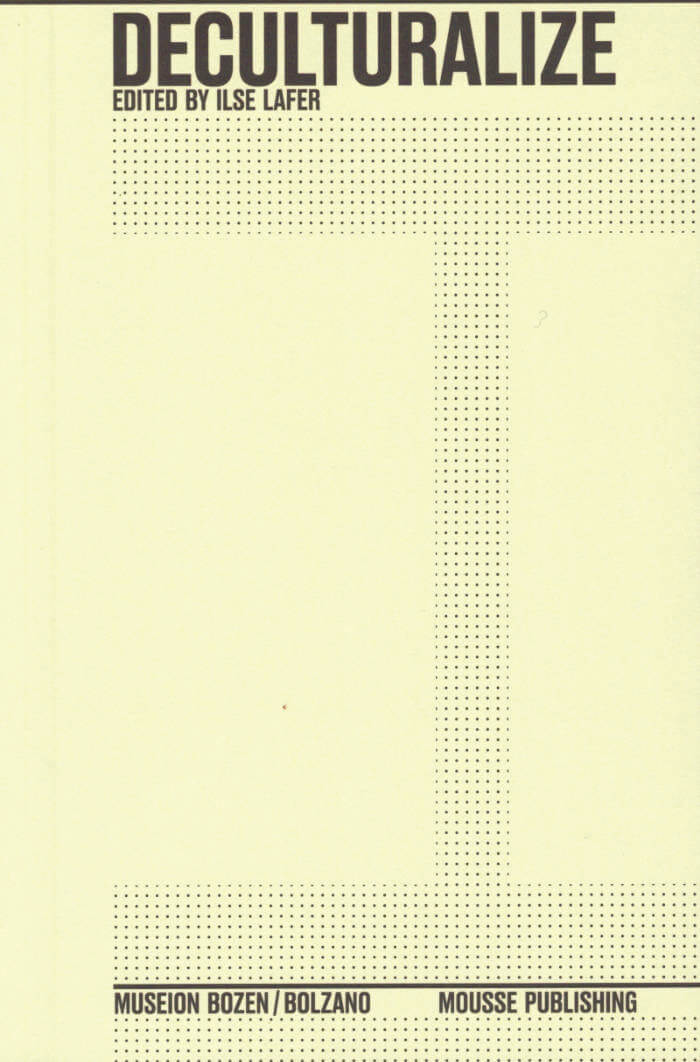
Deculturalize
The radical feminist practice of the Italian art historian, art critic, poet, and feminist Carla Lonzi (1931–1982) and its potential relationship to both historical and contemporary art practices offers the contextual framework for the publication Deculturalize.
Lonzi's recurring demand for deculturizzazione, echoed in the book's title, is based on her proclamation that women's inclusion in society must be understood as a constant colonization. Their ensuing "impotence, lack of history, lack of culture" and "insignificance" can thus only be abolished through the establishment of an "unexpected" (female) subjectivation. Rather than continuing to be the object of historical-social power dynamics, women must become the subject of their own life practices through their continuous withdrawal from (patriarchal) norms.
The book's authors explore if and to what degree Lonzi's radical feminist approach is based on art terms and concepts, or historical or contemporary art practices. The motivation was the exhibition Doing Deculturalization, presented at Museion, Bolzano, in 2019, and the related desire to address the (historically ambivalent) relationship between (Italian) female art and the formation of feminist theory.
Essays by Sabeth Buchmann, Laura Iamurri, Marco Scotini and Elvira Vannini, and Giovanna Zapperi focus on this by analyzing works by women artists whose practices are related to Lonzi's deculturizzazione concept. The contributions by artists Claire Fontaine, Ariane Müller, Margherita Morgantin (in conversation with Lia Cigarini) and Suzanne Santoro (in conversation with Ilse Lafer) present specific reflections on Lonzi's feminist legacy, which is always related to the individual artist's own artistic-feminist practice. Juxtaposed with these are philosophical and analytical concepts developed by Marc Rölli and Annarosa Buttarelli, who reconstruct Lonzi's theory of deculturizzazione based on its historical reference points and update it for the present.
With texts by Sabeth Buchmann, Annarosa Buttarelli, Claire Fontaine, Laura Iamurri, Ilse Lafer, Margherita Morgantin & Lia Cigarini, Ariane Müller, Letizia Ragaglia, Marc Rölli, Suzanne Santoro & Ilse Lafer, Marco Scotini & Elvira Vannini, Giovanna Zapperi.
Trilingual edition (English / German / Italian)

Common Tones – Selected interviews with artists and musicians 2000-2020
The collection of previously unpublished interviews and extended versions of Alan Licht's famous conversations with figures in the American art and musicscene.
For the past thirty years, Alan Licht has been a performer, programmer, and chronicler of New York's art and music scenes. His dry wit, deep erudition, and unique perspective—informed by decades of experience as a touring and recording guitarist in the worlds of experimental music and underground rock—have distinguished him as the go-to writer for profiles of adventurous artists across genres. A precocious scholar and improvisor, by the time he graduated from Vassar College in 1990 Licht had already authored important articles on minimalist composers La Monte Young, Tony Conrad, and Charlemagne Palestine, and recorded with luminaries such as Rashied Ali and Thurston Moore. In 1999 he became a regular contributor to the British experimental music magazine The Wirewhile continuing to publish in a wide array of periodicals, ranging from the artworld glossies to underground fanzines.
Common Tones gathers a selection of never-beforepublished interviews, many conducted during the writing of Licht's groundbreaking profiles, alongside extended versions of his celebrated conversations with artists, previously untranscribed public exchanges, and new dialogues held on the occasion of this collection. Even Lou Reed, a notoriously difficult interviewee also included here, was suitably impressed.
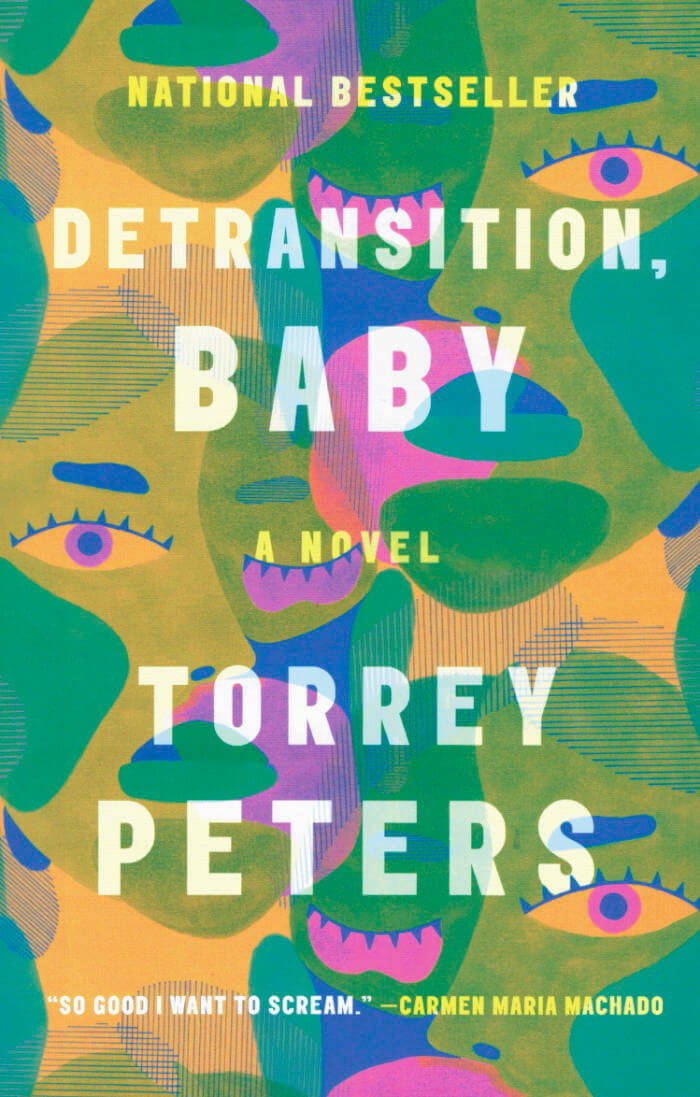
Detransition, Baby (paperback)
A whipsmart debut about three women — transgender and cisgender — whose lives collide after an unexpected pregnancy forces them to confront their deepest desires around gender, motherhood, and sex.
Torrey Peters is the author of the novellas Infect Your Friends and Loved Ones and The Masker, which are available for free on her website. She holds an MFA from the University of Iowa and an MA in Comparative Literature from Dartmouth. She grew up in Chicago and now lives in Brooklyn.
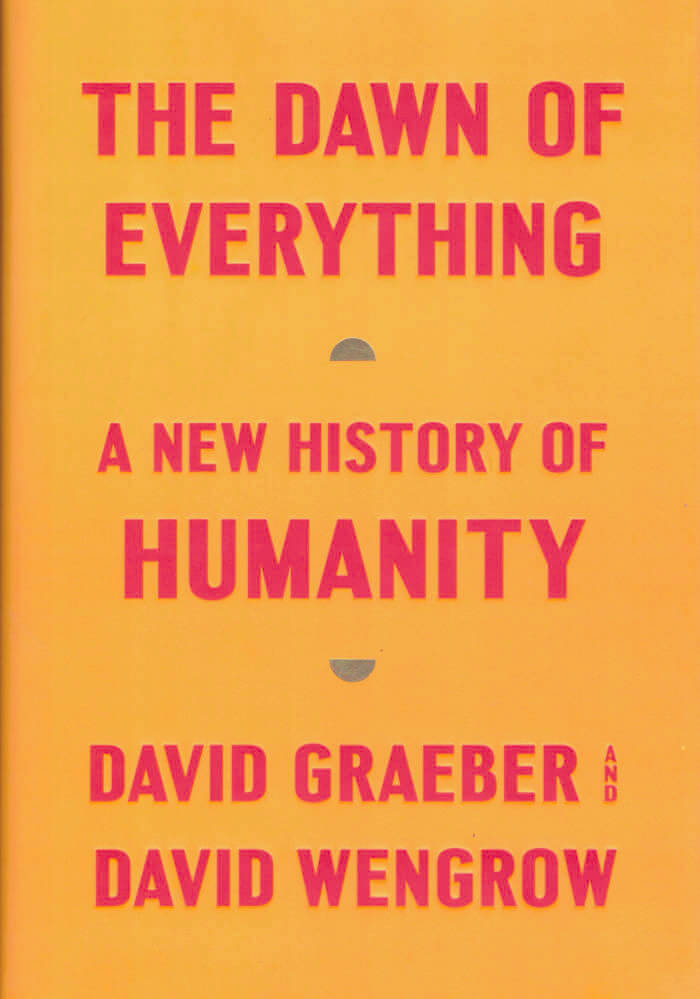
The Dawn of Everything: A New History of Humanity
A dramatically new understanding of human history, challenging our most fundamental assumptions about social evolution — from the development of agriculture and cities to the origins of the state, democracy, and inequality — and revealing new possibilities for human emancipation.
For generations, our remote ancestors have been cast as primitive and childlike — either free and equal innocents, or thuggish and warlike. Civilization, we are told, could be achieved only by sacrificing those original freedoms or, alternatively, by taming our baser instincts. David Graeber and David Wengrow show how such theories first emerged in the eighteenth century as a conservative reaction to powerful critiques of European society posed by Indigenous observers and intellectuals. Revisiting this encounter has startling implications for how we make sense of human history today, including the origins of farming, property, cities, democracy, slavery, and civilization itself.
Drawing on pathbreaking research in archaeology and anthropology, the authors show how history becomes a far more interesting place once we learn to throw off our conceptual shackles and perceive what's really there. If humans did not spend 95 percent of their evolutionary past in tiny bands of hunter-gatherers, what were they doing all that time? If agriculture, and cities, did not mean a plunge into hierarchy and domination, then what kinds of social and economic organization did they lead to? The answers are often unexpected, and suggest that the course of human history may be less set in stone, and more full of playful, hopeful possibilities, than we tend to assume.
"Graeber and Wengrow have effectively overturned everything I ever thought about the history of the world. A thorough and elegant refutation of evolutionary theories of history, The Dawn of Everything introduces us to a world populated by smart, creative, complicated people who, for thousands of years, invented virtually every form of social organization imaginable and pursued freedom, knowledge, experimentation, and happiness way before the "Enlightenment." The authors don't just debunk the myths, they give a thrilling intellectual history of how they came about, why they persist, and what it all means for the just future we hope to create. The most profound and exciting book I've read in thirty years." — Robin D.G. Kelley, Gary B. Nash Endowed Chair in U.S. History, UCLA, author of Freedom Dreams: The Black Radical Imagination
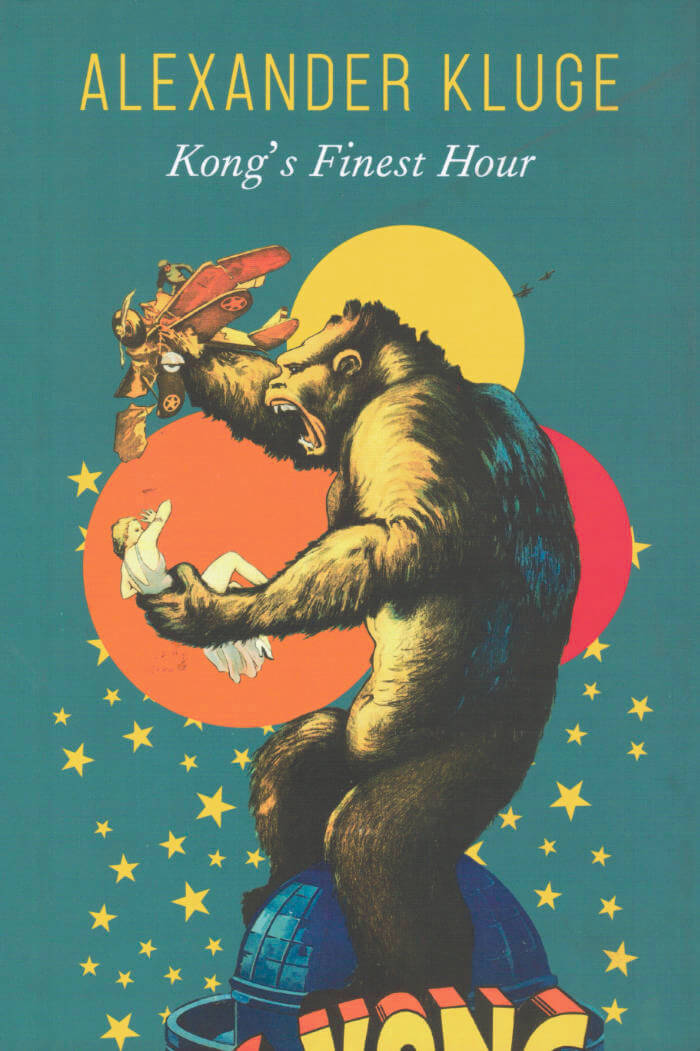
Kong's Finest Hour: A Chronicle of Connections
In a world full of devils, the giant ape Kong defends what he loves the most. But who and what is this undomesticated animal? Might it reside within us? As we tread confidently, is this where the earth opens up beneath us?
In Kong's Finest Hour, Alexander Kluge explores anew the accessible spaces where Kong dwells within us and in our million-year-old past. The more than two hundred stories contained in this volume form a chronicle of connections that together survey these spaces using diverse perspectives. These include stories about the folds of Kong's nose, the voice of the author's mother, the poet Heinrich von Kleist and Jack the Ripper, the indestructability of the political, and the supercontinent Pangaea that once unified the earth. Dissolving theory into storytelling has been Kluge's lifelong pursuit, and this magnificent collection tells stories of people as well of things.

A Poetics of the Press: Interviews with Poets, Printers, & Publishers
The publication of Donald Allen's The New American Poetry in 1960, as well as the Vancouver and Berkeley poetry conferences, sparked a poetic renaissance. It was an era rich in exploration and innovation that articulated a new relationship between form and content. Simultaneously, American artists began working with the book as a creative medium that rivaled the European tradition of the early twentieth century.
This book is the first collection of interviews with some of the pioneers working at the intersection of the artists book and experimental writing that continues to this day.
Includes interviews with Keith & Rosmaie Waldrop, Tom Raworth, Lyn Hejinian, Alan Loney, Mary Laird, Jonathan Greene, Alastair Johnston, Johanna Drucker, Phil Gallo, Steve Clay, Charles Alexander, Annabel Lee, Inge Bruggeman, Matvei Yankelevich, Anna Moschovakis, Aaron Cohick, and Scott Pierce. Co-published with Cuneiform Press.
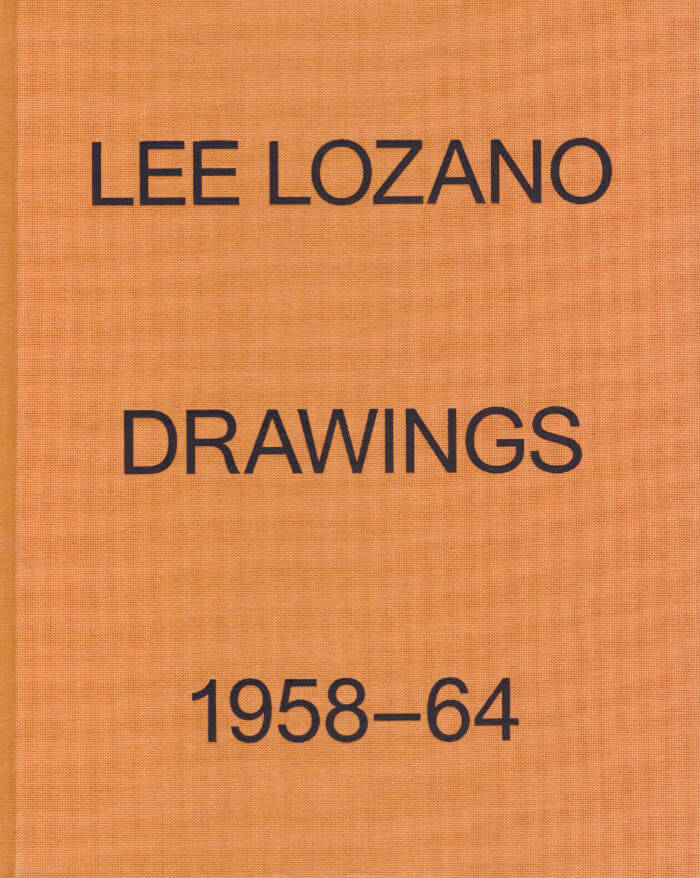
Lee Lozano: Drawings 1958-64
This 640-page volume comprises drawings from a critical six-year period in the development of American painter and conceptual artist Lee Lozano's (1930-99) practice. Her daring, facetious sketches investigate issues of gender and the body through the erogenous anthropomorphization of tools.
Lee Lozano: Drawings 1958-64 includes two newly commissioned essays by Helen Molesworth and Tamar Garb.
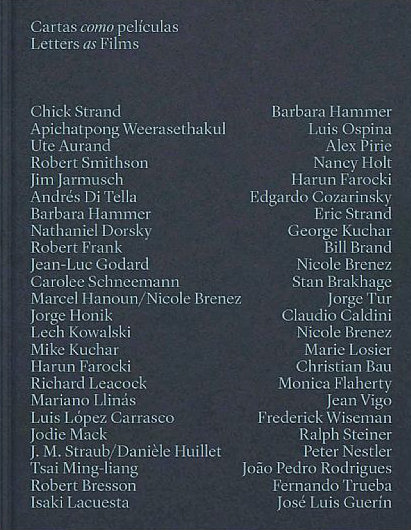
Letters As Films
Fascinating letters and ephemera from experimental filmmakers such as Maya Deren, Nathaniel Dorsky, Jim Jarmusch, Harun Farocki, Jean Vigo and more.
More than 50 postcards, manuscripts, typewritten letters and even emails are presented alongside stills, drawings and storyboards to create a stunning epistolary archive many years in the making. Curator and Punto de Vista International Documentary Film Festival director Garbiñe Ortega has compiled these materials in an effort to "create echoes and reverberations between materials which, as in a film, thanks to the editing, take on another meaning beyond their specific content."
The volume includes correspondence exchanged among filmmakers Jodie Mack, Jonas Mekas, Stan Brakhage, Jorge Honik, Claudio Caldini, Lech Kowalski, Nicole Brenez, Marcel Hanoun, Nathaniel Dorsky, George Kuchar, Nazli Dinçel, Norman McLaren, Maya Deren, Jean Vigo, Richard Leacock, Monica Flaherty, Richard Linklater, Gabe Kingler, Robert Breer, Robert Smithson, Nancy Holt, Fernando Trueba, Jean-Marie Straub, Jim Jarmusch, Hanun Farocki, Robert Frank, Fred Wiseman, Margaret Tait, Ute Aurand, Terrence Malick, Lynne Sachs and Gunvor Nelson.

I Should Have Known Better
I Should Have Known Better is a sequel to the sleeper hit I'm Open to Anything (2019), expanding the original's scope and ambition.
I Should Have Known Better's first person narrator, while working at a dead-end job in Los Angeles during the mid-1990s, reconnects with his best friend Moira, recently returned from Central America, and makes a new friend, Bernie, who teaches the history of photography. The two of them convince him to pursue a master's degree as a way of escaping the unrewarding life of a video store clerk. Once the narrator is exposed to an academic environment, he takes a dim view of the education that art school has to offer, but is happy to meet a group of talented fellow students who become close friends. He encounters a number of art world figures, ranging from the brilliant to the abject, who disabuse him of his illusions. The narrator has his most instructive experiences off campus, especially a love affair with the handsome and mercurial Temo, an insolent rich kid who leads a double life. Together they explore their sexual limits in scenes of bracing explicitness. I Should Have Known Better bears witness to the last gasp of Los Angeles bohemia at the end of the twentieth century.
The novel paints precise portraits of inspired eccentrics devoted to pursuing their dreams, "shopping artists" who believe in nothing but hedonism, and latter-day leftists who find themselves directionless after the fall of communism. Above all, the book pays tribute to the impulsive experiments and intense friendships of youth.

Auditing Intimacy
Office for Joint Administrative Intelligence
Auditing Intimacy is a collection of postal correspondence, photographs and declassified documents produced by Chris Dreier and Gary Farrelly between 2015 and 2020 under the banner of their shared practice The Office for Joint Administrative Intelligence. In a spirit of transparency and full disclosure, the publication contains a certified, independent and critical audit of the practice by Alicja Melzacka. The project was undertaken to commemorate the fifth anniversary of O.J.A.I.
Edited by Chris Dreier and Gary Farrelly
Artworks by Chris Dreier and Gary Farrelly
Essay by Alicja Melzacka
Design by Zero Desk
Documentation by Pauline Miko
Published by Fantôme Verlag
174 pages
Office for Joint Administrative Intelligence is the collaborative practice of artists Chris Dreier (DE) and Gary Farrelly (IRE/BE). The work is fuelled by a recurring obsession with architecture, infrastructure, finance, institutional power and DIY ritualism. O.J.A.I. pursues a strategy of self-institutionalisation where tools and codified rules of engagement are appropriated from economic and political infrastructures for the purposes of structuring intimacy and conjuring autonomy.
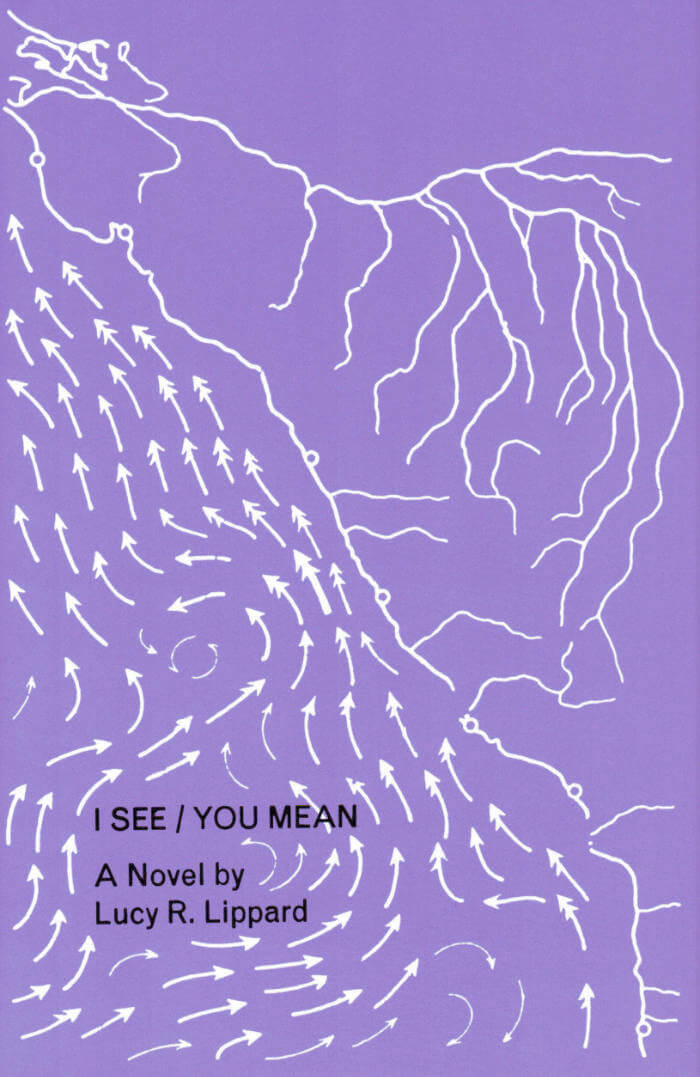
I See / You Mean
I See / You Mean is an experimental novel about mirrors, maps, relationships, the ocean, elusive success, and possible happiness. Through a collage of verbal photographs, overheard dialogue, sexual encounters, found material, and self identification devices (astrology, the I Ching, palmistry, Tarot), it charts from past to future the changing currents between two women and two men: a writer, a model/stockbroker/maybe dictator, a photographer, and an actor. A lot happens between the lines. Art critic Lucy Lippard wrote this novel in 1970 and became a feminist in the process: “I started writing and realized I was ashamed to be a woman. Then I had to find out why. Then I got very angry. The fragmented visual form came out of contemporary art and the conflicting emotions of 1960s political confrontation; they suggested a new way to put things back together—an open-ended, female way that didn’t pretend conclusions.”
Lucy R. Lippard is a writer, activist, and curator. She is the author of twenty-five books on contemporary art and cultural criticism and has curated some fifty exhibitions in the United States, Europe, and Latin America.
Afterword by Susana Torre
Edited by Jeff Khonsary
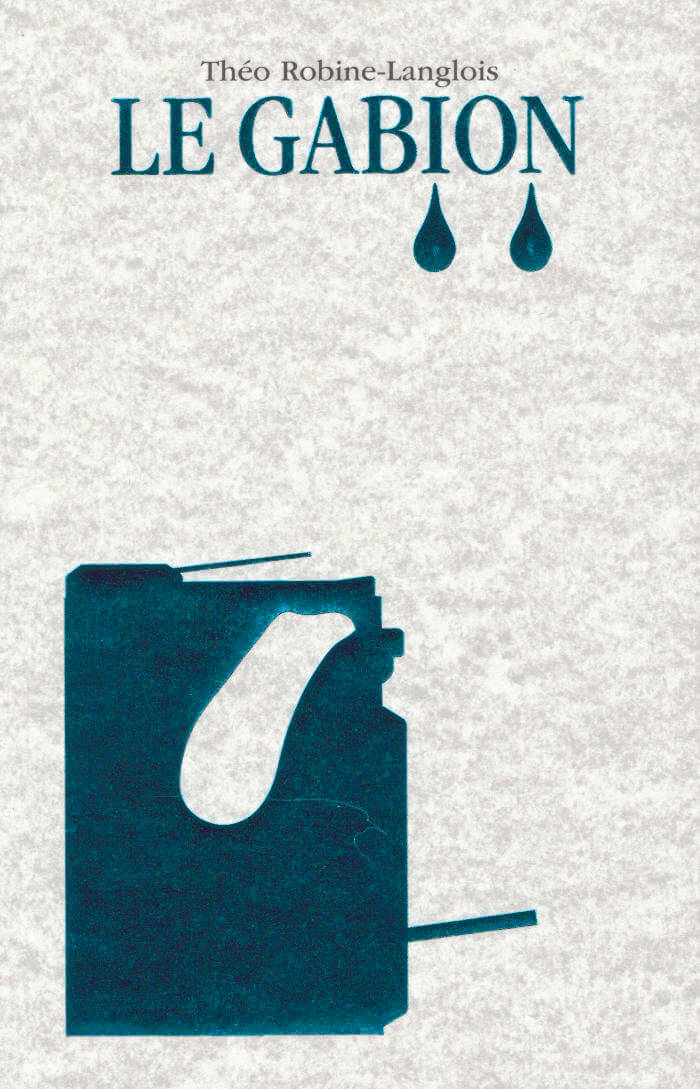
Le Gabion
Au départ, une simple anecdote: un gabion de chasse typique des marais normands se détache de son ancrage pour dériver dans l’Océan Atlantique, avec des chasseurs incapables de nager à son bord. Théo Robine-Langlois transpose cette histoire à une échelle interstellaire: le Gabion, vaisseau spatial chasseur d’astéroïdes conçu pour être attaché à la Terre, dérive dans l’espace. À la suite d’Anton, on traverse les différentes communautés qui peuplent le bâtiment, monde en soi où se côtoient et s’affrontent des mœurs, des modèles de société, et surtout des formes de langage. Anton, lui, tente d’échapper à celui qui prétend régir le vaisseau, en récoltant des photocopies éparpillées dans ses méandres, jusqu’à son mystérieux cœur...
Empruntant au roman d’apprentissage autant qu’à la science-fiction, Le Gabion est aussi une chanson de geste: une odyssée symbolique où la langue et la figure de l’auteur sont traités de manière expérimentale, comme faisant partie du récit lui-même. Les langues que parlent les personnages contaminent le livre, qui se construit comme un montage où poésie, philosophie, histoire littéraire, hip hop et échanges SMS se rejoignent. En parcourant le Gabion, les lecteur.trice.s rencontrent différents rapports au langage, qui se concrétisent à la fin du livre par l’élection d’un maire de banlieue parisienne.
Le Gabion poursuit le travail entamé par Théo Robine-Langlois dans son premier livre, [...], où le subterfuge typographique des points de suspension entre crochets signifiait à la fois l’existence de trous dans la langue, d’échappatoires dans l’imaginaire, et de nuages dans le ciel. Dans Le Gabion, on peut se cacher dans un paragraphe, lire entre les lignes d’un manuel de photocopieuse, se battre avec des missiles-poèmes, rencontrer des enfants sanguinaires et des sororités féministes. On traverse également plusieurs siècles de poésie française, des troubadours à Henri Chopin ou Hélène Bessette.
Texte en Français

You have within you something stronger and more numinous
'You have within you something stronger and more numinous' by Margarita Maximova is a collection of extracts of letters sent to her by her mother over the course of ten years.

Some Styles of Masculinity
An intimate, urgent and riotous account of masculinity, whiteness, queerness and belief in America.
In winter 2018, Gregg Bordowitz performed a three-part lecture series at the New Museum as part of Trigger: Gender as a Tool and a Weapon. Each evening, he explored an avatar of masculinity that was formative to him as he came of age as an outer-borough child of Jewish immigrants, then as an artist-activist in Manhattan at the dawn of the AIDS crisis: the rock star, the rabbi and the comedian. He merged personal and political history, ribald humor and social criticism, performer and persona.
Some Styles of Masculinity is a self-portrait and an essay on upheaval and plague, based on transcripts of the eponymous series, which Bordowitz has reimagined for the page. He asserts that gender can't be separated from ethnicity, sexuality, class or nationality, and he connects these aspects of himself through personal anecdotes as well as reflections on whiteness, diaspora, comedy and Jewish mysticism. Some Styles of Masculinity evokes David Antin's "talk poems," Maggie Nelson's "autotheory," David France's How to Survive a Plague and Wayne Koestenbaum's casually erudite criticism. This book is a winding, intimate, urgent, freewheeling account of thinking and enduring in difficult times.
Gregg Bordowitz (born 1964) is the author of Glenn Ligon: Untitled (I Am a Man) (2018), General Idea: Imagevirus (Afterall Books, 2010) and The AIDS Crisis Is Ridiculous and Other Writings, 1986-2003 (2004). He was an early participant in ACT UP (AIDS Coalition to Unleash Power), where he cofounded several video collectives.

The Essential June Jordan
The Essential June Jordan honors the enduring legacy of a poet fiercely dedicated to building a better world. In this definitive volume, featuring an afterword by Pulitzer Prize-winner Jericho Brown, June Jordan’s generous body of poetry is distilled and curated to represent the very best of her works.
Written over the span of several decades―from Some Changes in 1971 to Last Poems in 2001―Jordan’s poems are at once of their era and tragically current, with subject matter including racist police brutality, violence against women, and the opportunity for global solidarity amongst people who are marginalized or outside of the norm. In these poems of great immediacy and radical kindness, humor and embodied candor, readers will (re)discover a voice that has inspired generations of contemporary poets to write their truths. June Jordan is a powerful voice of the time-honored movement for justice, a poet for the ages.
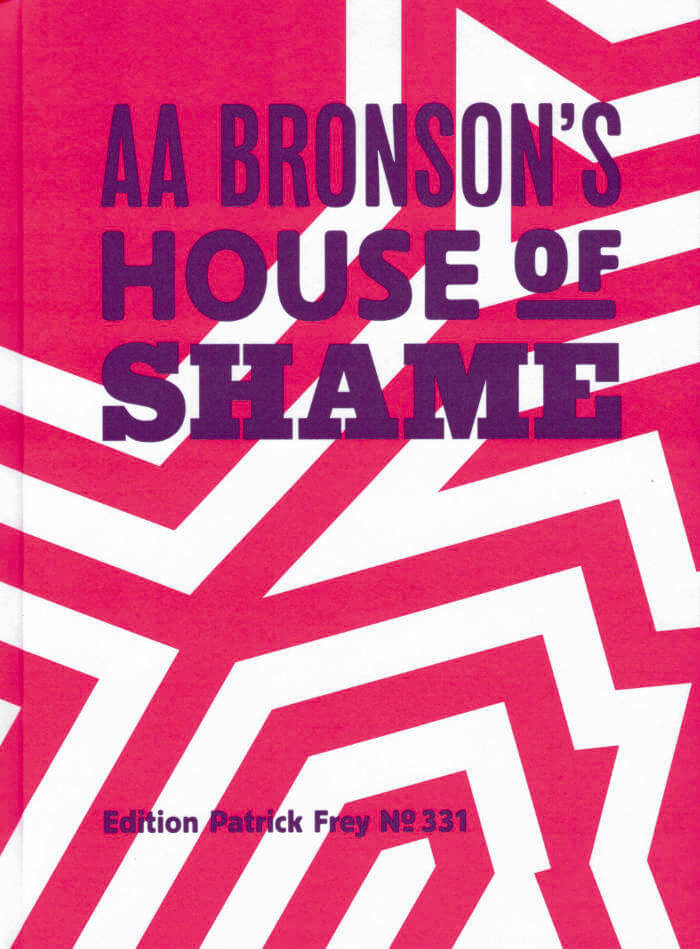
AA Bronson's House of Shame
A look back in text and images at AA Bronson 's (collective) production between 2013 and 2018.
A nocturnal secret ritual performed by two naked men in a hotel room in the Netherlands; a woven tent where the artist dressed as a mage encounters visitors to share their traumas; buttplugs adorned with rooster feathers; a collection of queer zines; anal-sprayed tartan paintings; a zen garden of mugwort. A few of the singular artistic gestures AA Bronson committed in the last few years are united in this book.
After his General Idea partners, Felix Partz and Jorge Zontal, passed away in 1994, AA Bronson had to learn how to keep on living by himself, inventing a personal identity without his former companions, creating a new community of work, friendship and love. These issues have been at the core of his art in the last 25 years. He has developed a work where collaboration with other artists, especially younger queer artists, and creation of a social bond are central.
AA Bronson's House of Shame aims to emphasize this social dimension in his work through an overview of a series of exhibitions he made between 2013 and 2018. These are shows that bring together a community of artists; shows where performances and rituals, often invisible, contribute to the creation of a shared experience; a unique blend of art, friendship, collaboration, spirituality and humour.
The book is in two-parts. An initial monographic section, which includes an essay and an interview with the artist, brings together the works and the exhibitions. In the second, choral part, friends have been invited to bear witness and write a sort of 'journal de bord,' telling the tale of five years of the artist's community life.
With a foreword by Vincent Simon, a text by Paul Clinton, and an interview by Frédéric Bonnet, and contributions from Philip Aarons, Defne Ayas, Elijah Burger, Matthias Herrmann, Richard John Jones, Bradford Kessler, Terence Koh, Sholem Krishtalka, Mark Jan Krayenhoff van de Leur, Gareth Long, Chrysanne Stathacos, Scott Treleaven, and Louwrien Wijers.

Hooker's Green Lake
A series of recent drawings by London-based artist Faye Wei Wei.
Faye Wei Wei (born 1994) is a British artist. She has had solo shows at Project Room, Galerie Kandlhofer, Vienna (2020), Cob Gallery, London (2019), SADE Gallery, Los Angeles (2018), Centre For Chinese Contemporary Art, Manchester (2018)... She graduated from the Slade School of Fine Art in 2016. She lives and works in London.

Cruiser L'Utopie
First French translation of José Esteban Muñoz's field defining work—an intellectual inspiration for a generation of LGBTQ scholars.
Cruiser l'utopie describes a movement, a drifting advance between theory, philosophy, art criticism and personal narrative. The works cited, narrated, are mixed with family or individual narrative and more academic considerations. This practice of queer theory and aesthetics is part of a new interpretation of hope as perceived by philosopher Ernst Bloch, articulated with black radical thought and the poetic research of authors such as Fred Moten and Eileen Myles.
Muñoz focuses here on the period of the Stonewall revolts (New York, 1969) and analyzes, for example, the works of Frank O'Hara, King Jone/Amiri Baraka, Andy Warhol, Kevin Avance, Samuel R. Delany, Fred Herko, Jill Johnston, Ray Johnson. Queer theory as a study has a new way of researching and writing, a form of hybridity between philosophy and cultural studies. The critique is, as if by anticipation, contained in the counter-normative artistic practice and daily life whose narratives, both subjective and historical, hint at a queer future, a place of transformation and liberation.
The text, translated from English by Alice Wambergue, is accompanied by a preface by Elisabeth Lebovici and a poem by Fred Moten.
José Esteban Muñoz (1967 - 2013) is a queer scholar and art theorist. Author of The Sense of Brown (published posthumously in 2020), Cruising Utopia, the Aftermath and Elsewhere of Queer Advent (2009), and Disidentifications: Queers of Color and the Performance of Politics (1999), he edited the collective works Pop Out: Queer Warhol (1996) and Everynight Life: Culture and Dance in Latin/o America (1997). Muñoz has long taught in the Department of Performance Studies at New York University's Tisch School of the Arts and edited the Sexual Cultures series at New University Press, where he has published works such as Jack Halberstam and Samuel Delany.

On the Necessity of Gardening
For centuries, the garden has been regarded as a mirror of society, a microcosm, in which the broader relationships between nature and culture are played out on small scale. From this long cultural tradition also raises a call for a new awareness of our relationship with the Earth.
On the Necessity of Gardening tells the story of the garden as a rich source of inspiration. Over the centuries, artists, writers, poets and thinkers have each described, depicted and designed the garden in different ways. In medieval art, the garden was a reflection of paradise, a place of harmony and fertility, shielded from worldly problems.
However, the garden is not just a neutral place and intended solely for personal pastime, it is a place where the world manifests itself and where the relationship between culture and nature is expressed. In the eighteenth century this image shifted: the garden became a symbol of worldly power and politics. The Anthropocene, the era in which man completely dominates nature with disastrous consequences, is forcing us to radically rethink the role we have given nature in recent decades.
There is a renewed interest in the theme of the garden among contemporary makers. It is not a romantic desire that drives them, but rather a call for a new awareness of our relationship with the earth, by connecting different fields of activity in landscape, art and culture. Through many different essays and an extensive abecedarium, On the Necessity of Gardening reflects on the garden as a metaphor for society, through concepts such as botanomania and capitalocene, from guerrilla gardening to queer ecology and zen garden.
Contributors: Maria Barnas, Jonny Bruce, Laurie Cluitmans, Thiëmo Heilbron, Liesbeth M. Helmus, Erik A. de Jong, René de Kam, Alhena Katsof, Jamaica Kincaid, Bart Rutten, Catriona Sandilands, Patricia de Vries.

Fanta For The Ghosts
fanta for the ghosts by Elisabeth Molin
120mm x 210mm
edition of 500
Co-published with OneThousandBooks and Elisabeth Molin
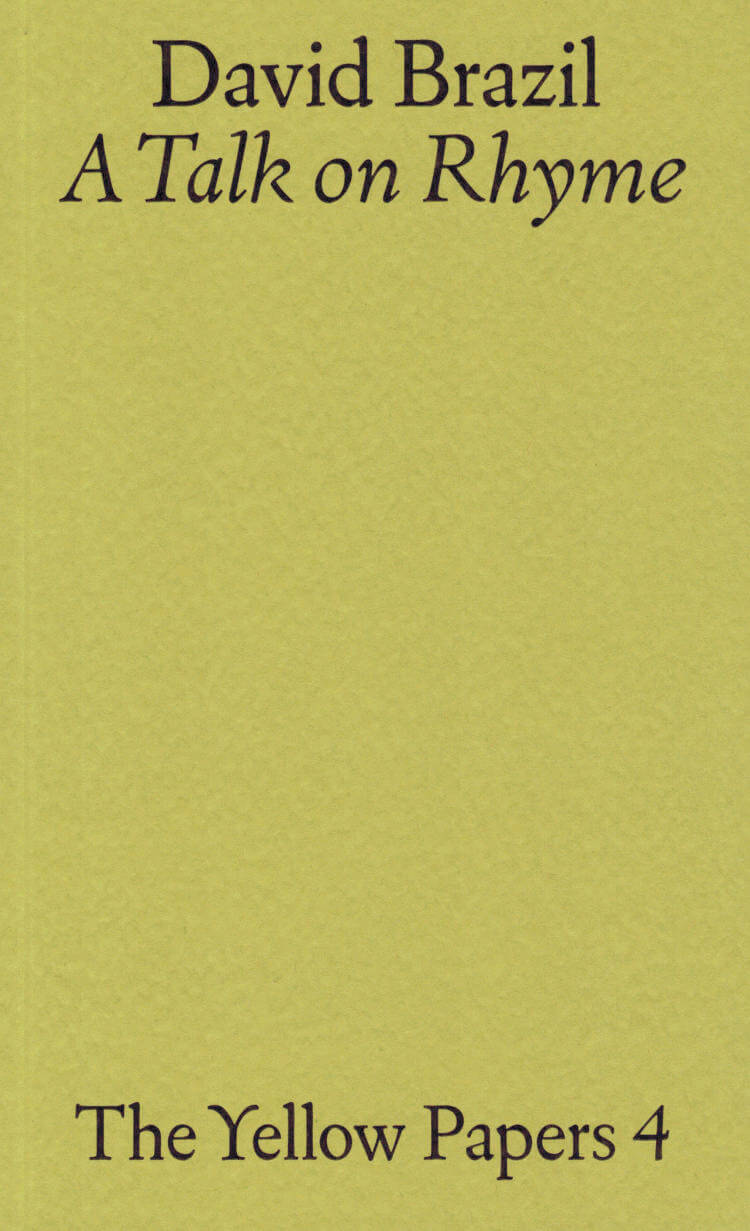
A Talk on Rhyme
In A Talk on Rhyme, a text distilled from a lecture given in 2014, poet David Brazil reflects on rhyme’s “emergence, progress, inoperativity, and prospect.” The Talk is supplemented by an essayistic bibliography on subjects ranging from classical prosody to American folk music, via writings on and by poets long dead whose names are obvious: Saint Paul, Dickinson, Herbert, Spicer, Hölderlin, Dante, O’Hara.

Can the Subaltern Speak?
Gayatri Chakravorty Spivak, Estefanía Peñafiel Loaiza
Gayatri Chakravorty Spivak's landmark essay in decolonial thought is animated for a new generation with art by Estefanía Peñafiel Loaiza.
In 1985 Gayatri Chakravorty Spivak's seminal essay, 'Can the Subaltern Speak' transformed the analysis of colonialism. In a deeply divided world Spivak's text interrogated the historical and ideological factors that, by obstructing the potential for certain subjects to be heard, maintained the degraded status of those subjects on the world's peripheries. The text remains, in the third decade of the twenty-first century, as compelling as ever, and affirms the continuing relevance of Marxism to contemporary decolonial thought.
In this Afterall Two Works edition, the essay is given new life in dialogue with especially commissioned artwork by Ecuadorian artist Estefanía Peñafiel Loaiza. Loaiza's preoccupation with questions of visibility and occlusion, the need for and absence of the image, has guide the creation of a mesmerising set of works. These form a visual vocabulary that echoes and refracts Spivak's central terms, bringing new inflections to an enduringly important text.
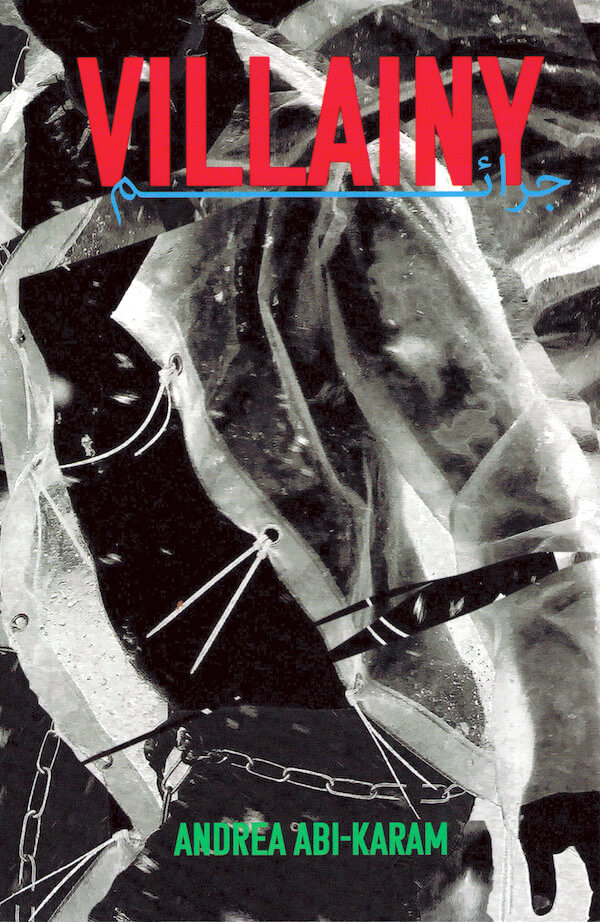
Villainy
Harnessing street protest as a poetic formation, Villainy exhibits the desires that bring queers into public space.
Andrea Abi-Karam answers the call to action for poetry itself to become the radical accomplice it was destined to be in their second book, Villainy. In order to live through the grief of the Ghostship Fire & the Muslim Ban, Villainy foments political action in public spaces, and indexes the various emotional states, such as rage, revelry, fear, grief, and desire to which queers must tend during protest. In scenes loaded with glitter, broken glass, and cum, Abi-Karam insists that in order to shatter the rising influence of new fascism we must embrace the collective work of antifascists, street medics, and queer exhibitionists and that the safety that we risk is reckless and necessary. Disruptive and demanding, these punk poems embody direct action and invite the audience into the desire-filled slippage between public sex and demonstration. At heart, Villainy aims to destroy all levels of hierarchy to establish a participatory, temporary autonomous zone in which the targeted other can thrive.
Published September 2021
Andrea Abi-Karam is an arab-american genderqueer punk poet-performer cyborg, writing on the art of killing bros, the intricacies of cyborg bodies, trauma and delayed healing. Selected by Bhanu Khapil, Andrea's debut EXTRATRANSMISSION (Kelsey Street Press, 2019), is a poetic critique of the U.S. military's role in the War on Terror. Simone White selected their second assemblage, Villainy for publication in Fall 2021 at Nightboat Books. With Kay Gabriel, they co-edited We Want It All: An Anthology of Radical Trans Poetics released by Nightboat Books in November 2020. They are a Leo currently obsessed with queer terror and convertibles.